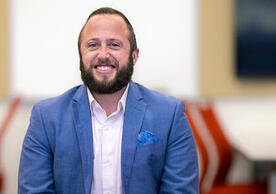
By Mallory Locklear
Nathan Levitt recently joined the Yale School of Nursing (YSN) faculty as a lecturer and director of LGBTQ and Gender Justice Learning. When he isn’t studying, teaching about, and providing health care for trans and non-binary populations, he’s out hiking and enjoying nature with his family and two dogs. We caught up with him for the latest edition of Office Hours, a Q&A series that introduces newcomers to the Yale faculty to the broader university community.
Title: Director of LGBTQ and Gender Justice Learning at the Yale School of Nursing
Research Interest: Health care for trans and non-binary populations
Prior Institution: New York University
Started at Yale: July 1, 2021
How would you describe your research interests?
Nathan Levitt: I have been involved in transgender health as a family nurse practitioner, as a researcher, and as an educator doing trainings, classes, and guest lecturing around the country. I’m also a trans-identified person, which means I understand firsthand the health disparities, barriers to care, and importance of nursing education. The specific areas that I focus on are primary care for trans populations and non-binary populations, gender affirming surgery care, hormone care, and creating a welcoming and affirming experience for the community.
What are your goals as the director of LGBTQ and Gender Justice Learning?
Levitt: This is a really exciting new position. I’m working with the faculty within the YSN community on integrating lesbian, gay, bisexual, transgender, queer — LGBTQ — learning into their curriculum. I’m helping YSN incorporate this into its policies, procedures, culture, and environment, and helping the school create a safe space for the students that are really working on a lot of these issues.
I also work with the Dean’s Advisory Council on LGBTQI+ Affairs — which includes representatives from YSN, the School of Public Health, the physician associate program, and the School of Medicine — and we’re looking at how we are integrating LGBTQ care, both within the curriculum and within the clinical practice of the Yale New Haven Hospital system.
How does it affect the patient experience when a health care provider is more informed on LGBTQ care?
Levitt: There are a lot of studies looking at what those disparities are. Around 50% of trans and non-binary patients are having to educate their health care providers during their appointments. A very large percentage of the population is just avoiding care for urgent or life-threatening conditions because they’re facing discrimination and ignorance and they’re treated with inappropriate care.
What we’ve noticed is that even something like calling a patient the right name, using their right pronoun, affirming their gender, affects the rest of their health. So they’re taking care of, let’s say, their asthma or their diabetes, they’re taking their medications — really taking care of themselves because they’re being treated with the respect that they deserve. So that is a huge change we’re noticing. When you train providers and clinicians on how to do this care in an affirming and educated way, people are coming in for care instead of avoiding it.
Has your five-year-old been enjoying all of the snow this winter?
Levitt: Oh yeah, having a lot of fun playing out there. We didn’t have outdoor space when we lived in Brooklyn. So we’re loving snowball fights and making snow angels.
You grew up in Florida. Is there anything you miss about the South and anything you’re particularly enjoying about the Northeast?
Levitt: I miss the warm weather, for sure! But growing up in Florida, we didn’t have real seasons; we didn’t see the change in the leaves. And so that’s something I’ve really loved out here. I think it’s really beautiful.
This piece was originally published in Yale News.
